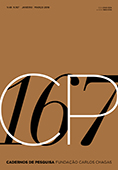Should teachers be trained in educational policies?
Keywords:
Teacher Education, Educational Policies, Education Objectives, ChileAbstract
This study reports on initial teacher education in educational policy through the construction of five case studies in the Biobío region, Chile. Three of them with actors involved in training in universities, another with public school teachers, and the last one is a document of the state policy that regulates teacher education processes in Chile. Results show that while universities prioritize knowledge and adjustment to the regulatory framework of national policy, in-service teachers demand to qualify in constructive criticism of state policies and competencies to construct policies together with the State based on their own work experience.
Downloads
References
AVALOS, B.; NORDENFLYCHT, M. E. (Coord.) La formación de profesores: perspectivas y experiencias. Santiago: Santillana, 1999
AYLWIN, P. Informe sobre situación de las carreras de pedagogía. 1994-1999. In: PÉRSICO, P. (Coord.). Informe sobre la educación superior en Chile. Santiago, Corporación de Promoción Universitaria – CPU, 1999.
BANCO INTERNACIONAL DE RECONSTRUCCIÓN Y FOMENTO; CHILE. Ministerio de Educación. Programa de Financiamiento por Resultados de la Educación Terciaria “MECESUP3” Manual Operacional. Santiago, Cl: Ministerio de Educación, 2014. Disponible en: <http://www.mecesup.cl/usuarios/MECESUP/File/2015/operaciones/CLMECE3MOPERAT20102014.pdf>. Acceso en: mar. 2017.
BENEITONE, P.; ESQUETINI, C.; GONZÁLEZ, J.; MARTY, M.; SIUFI, G.; WAGENAAR, R. (Ed.). Reflexiones y perspectivas de la educación superior en América Latina: Informe Final Proyecto Tuning-América Latina 2004-2007. San Sebastián: Universidad de Deusto, 2007.
BRAVO, N. Competencias proyecto Tuning-Europa, Tuning-América Latina. Informe de las cuatro reuniones del Proyecto Tuning-Europa-América Latina, 2007.
CHILE. Ministerio de Educación −MINEDUC. Estándares orientadores para egresados de carreras de pedagogía en educación básica. Pedagógicos y Disciplinares. Santiago: Mineduc, 2012.
CHILE. Ministerio de Educación −MINEDUC. Financiamiento institucional. Convenios por ámbitos. Formación inicial de profesores. Santiago: Mineduc, 2015. Disponible en:
<http://www.mecesup.cl/index2.php?id_contenido=15048&id_portal=59&id_seccion=3606>. Acceso en: abr. 2017.
CHILE. Ministerio de Educación – MINEDUC. Ley 20129. Establece un sistema nacional de aseguramiento de la calidad de la educación superior. Santiago, Biblioteca Nacional, 2006.
Disponible en: https://www.leychile.cl/Navegar?idNorma=255323. Acceso en: ene. 2018.
COX, C.; GYSLING, J. La formación del profesorado en Chile. 1842-1987. Santiago: CIDE, 1990.
CUENCA, R. .Hacia dónde va la formación docente en América Latina?, In: CUENCA, R.; NUCINKIS, N.; ZABALA, V. (Comp.). Nuevos maestros para América Latina. Madrid: Morata, 2007. Cap.1, p. 23-36.
CUENCA, R.; NUCINKIS, N.; ZABALA, V. Nuevos maestros para América Latina. Madrid: Morata, 2007.
DAY, C.; GU, Q. Profesores: vidas nuevas, verdades antiguas. Madrid: Narcea, 2014.
DÍAZ BARRIGA, A. El enfoque de competencias en educación: .una alternativa o un disfraz de cambio? Perfiles Educativos, México, v. 28, n. 111, p. 7-36, enero/marzo 2006.
FERRADA, D. La investigación participativa dialógica. In: REDÓN PANTORRA, S.; RASCO ANGULO, J. F. (Coord.). Metodología cualitativa en educación. Madrid: Mino y Dávila, 2017. Cap. 12, p. 187-201.
FERRADA, D.; VILLENA, A.; TURRA, O. Transformar la formación. Las voces del profesorado. Santiago: RIL, 2015.
FERRADA, D. et al. Investigación dialógica-kishu kimkelay ta che en educación. Revista REXE, Concepción, Cl, v. 13, n. 26, p. 33-50, ago./dic. 2014.
FREIRE, P. Política y educación. México: Siglo XXI, 1996. FREIRE, P. La educación como práctica de la libertad. Buenos Aires: Siglo XXI, 2004.
GAETE, A.; GÓMEZ, V.; BASCOPÉ, M. .Qué le piden los profesores a la formación inicial docente en Chile? Centro de Políticas Públicas, Santiago, Cl, v. 11, n. 86, p. 1-18, enero 2016.
GAYÁ WICKS, P.; REASON, P. Initiating action research: challenges and paradoxes of opening communicative space. Action Research, London, v. 7, n. 3, p. 243-262, September 2009.
GONZÁLEZ, J.; WAGENAAR, R.; BENEITONE, P. Tuning-América Latina: un proyecto de las universidades. Revista Iberoamericana de Educación, Madrid, v. 35, p. 151-164, mayo/ago. 2004.
GUBA, E.; LINCOLN, Y. Controversias paradigmáticas, contradicciones y confluências emergentes. In: DENZIN, N.; LINCOLN, I. (Ed.) Paradigmas y perspectivas en disputa. Barcelona: Gedisa, 2012. v. II, cap. 8, p. 38-78.
HERON, J.; REASON, P. A participatory inquiry paradigm. Qualitative Inquiry, v. 3, n. 3, p. 274-294, September 1997.
RUFFINELLI, A. La calidad de la formación inicial docente en Chile: la perspectiva de los profesores principiantes. Calidad en la Educación, Santiago, n. 39, p. 118-154, dic. 2013.
ZEICHNER, K. La formación del profesorado y la lucha por la justicia social. Madrid: Morata, 2010.
Downloads
Published
How to Cite
Issue
Section
License
Copyright (c) 2018 Cadernos de Pesquisa

This work is licensed under a Creative Commons Attribution-NonCommercial 4.0 International License.
Authors who publish in this journal agree to the following terms:
a. Authors retain the copyright and grant the journal the right to first publication, with the paper simultaneously licensed under the Creative Commons Attribution license that allows the sharing of the paper with acknowledgment of authorship and initial publication in this journal.
b. Authors are authorized to assume additional contracts separately, for non-exclusive distribution of the version of the paper published in this journal (for example publishing in institutional repository or as a book chapter), with acknowledgment of authorship and initial publication in this journal.
c. Authors are allowed and encouraged to publish and distribute their paper on-line (for example in institutional repositories or on their personal page) at any moment before or during the editorial process, as this can generate productive changes, as well as increase the impact and citation of the published paper (See The Effect of Open Access).









